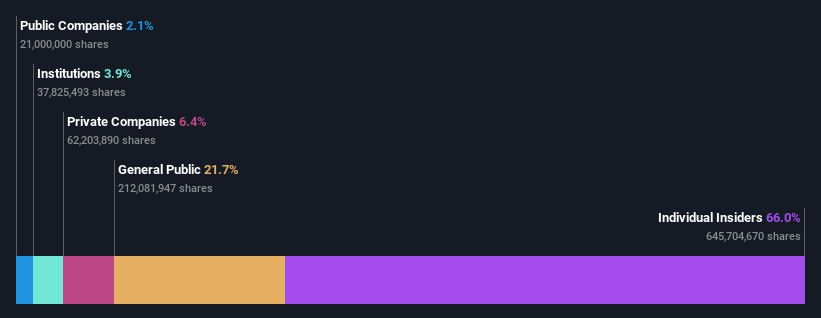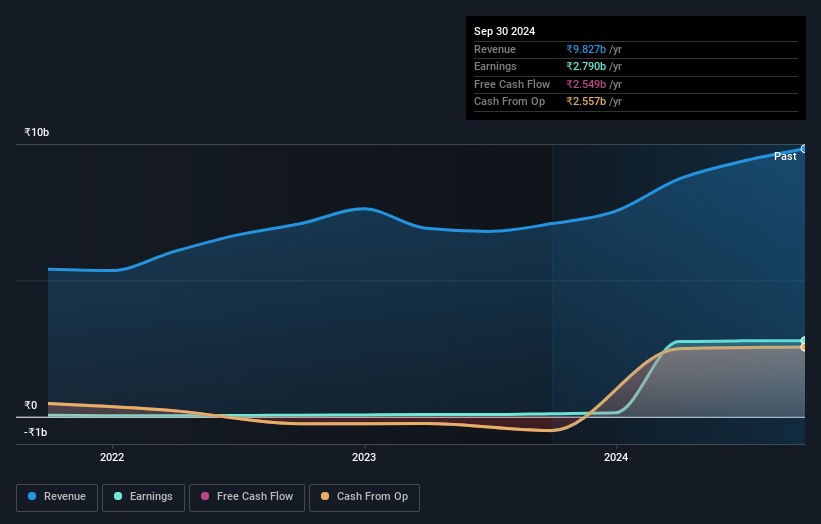Sarveshwar Foods Limited's (NSE:SARVESHWAR) market cap increased by ₹871m, insiders receive a 66% cut

Key Insights
- Sarveshwar Foods' significant insider ownership suggests inherent interests in company's expansion
- The largest shareholder of the company is Rohit Gupta with a 55% stake
- Ownership research, combined with past performance data can help provide a good understanding of opportunities in a stock
If you want to know who really controls Sarveshwar Foods Limited (NSE:SARVESHWAR), then you'll have to look at the makeup of its share registry. We can see that individual insiders own the lion's share in the company with 66% ownership. In other words, the group stands to gain the most (or lose the most) from their investment into the company.
As a result, insiders scored the highest last week as the company hit ₹9.6b market cap following a 10% gain in the stock.
Let's take a closer look to see what the different types of shareholders can tell us about Sarveshwar Foods.
See our latest analysis for Sarveshwar Foods

What Does The Institutional Ownership Tell Us About Sarveshwar Foods?
Many institutions measure their performance against an index that approximates the local market. So they usually pay more attention to companies that are included in major indices.
Since institutions own only a small portion of Sarveshwar Foods, many may not have spent much time considering the stock. But it's clear that some have; and they liked it enough to buy in. If the business gets stronger from here, we could see a situation where more institutions are keen to buy. When multiple institutional investors want to buy shares, we often see a rising share price. The past revenue trajectory (shown below) can be an indication of future growth, but there are no guarantees.

Sarveshwar Foods is not owned by hedge funds. Rohit Gupta is currently the largest shareholder, with 55% of shares outstanding. This essentially means that they have extensive influence, if not outright control, over the future of the corporation. In comparison, the second and third largest shareholders hold about 3.0% and 2.3% of the stock.
Researching institutional ownership is a good way to gauge and filter a stock's expected performance. The same can be achieved by studying analyst sentiments. Our information suggests that there isn't any analyst coverage of the stock, so it is probably little known.
Insider Ownership Of Sarveshwar Foods
The definition of an insider can differ slightly between different countries, but members of the board of directors always count. Management ultimately answers to the board. However, it is not uncommon for managers to be executive board members, especially if they are a founder or the CEO.
I generally consider insider ownership to be a good thing. However, on some occasions it makes it more difficult for other shareholders to hold the board accountable for decisions.
Our most recent data indicates that insiders own the majority of Sarveshwar Foods Limited. This means they can collectively make decisions for the company. That means they own ₹6.3b worth of shares in the ₹9.6b company. That's quite meaningful. Most would be pleased to see the board is investing alongside them. You may wish todiscover (for free) if they have been buying or selling.
General Public Ownership
The general public, who are usually individual investors, hold a 22% stake in Sarveshwar Foods. While this group can't necessarily call the shots, it can certainly have a real influence on how the company is run.
Private Company Ownership
Our data indicates that Private Companies hold 6.4%, of the company's shares. It's hard to draw any conclusions from this fact alone, so its worth looking into who owns those private companies. Sometimes insiders or other related parties have an interest in shares in a public company through a separate private company.
Next Steps:
It's always worth thinking about the different groups who own shares in a company. But to understand Sarveshwar Foods better, we need to consider many other factors. Case in point: We've spotted 2 warning signs for Sarveshwar Foods you should be aware of.
If you would prefer check out another company -- one with potentially superior financials -- then do not miss this free list of interesting companies, backed by strong financial data.
NB: Figures in this article are calculated using data from the last twelve months, which refer to the 12-month period ending on the last date of the month the financial statement is dated. This may not be consistent with full year annual report figures.
New: Manage All Your Stock Portfolios in One Place
We've created the ultimate portfolio companion for stock investors, and it's free.
• Connect an unlimited number of Portfolios and see your total in one currency
• Be alerted to new Warning Signs or Risks via email or mobile
• Track the Fair Value of your stocks
Have feedback on this article? Concerned about the content? Get in touch with us directly. Alternatively, email editorial-team (at) simplywallst.com.
This article by Simply Wall St is general in nature. We provide commentary based on historical data and analyst forecasts only using an unbiased methodology and our articles are not intended to be financial advice. It does not constitute a recommendation to buy or sell any stock, and does not take account of your objectives, or your financial situation. We aim to bring you long-term focused analysis driven by fundamental data. Note that our analysis may not factor in the latest price-sensitive company announcements or qualitative material. Simply Wall St has no position in any stocks mentioned.
About NSEI:SARVESHWAR
Sarveshwar Foods
Manufactures and sells of basmati and non basmati rice in India.
Solid track record with excellent balance sheet.


